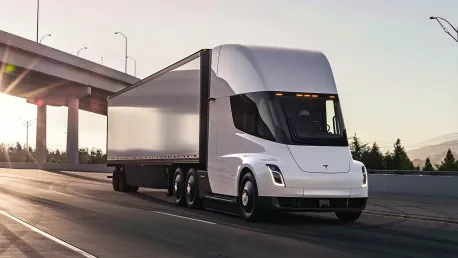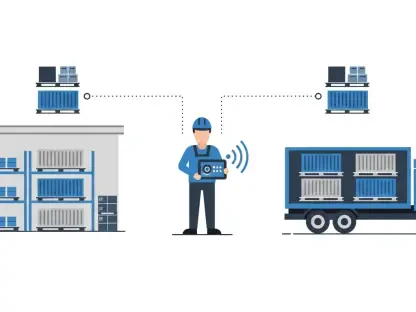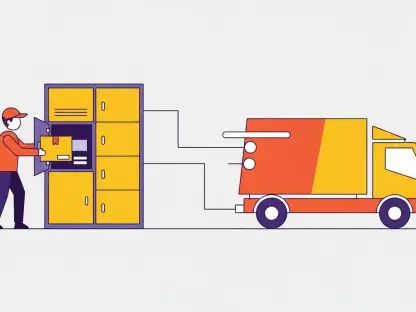The logistics industry is undergoing a profound transformation as electric vehicles (EVs) rapidly gain traction as the standard for transportation. Spurred by advancements in technology, government incentives, and a collective commitment to sustainability, the adoption of electric trucks offers a multitude of benefits that are reshaping the logistics landscape. This movement towards EVs is not merely about introducing new technology; it is fundamentally about improving operational efficiency, enhancing safety, and significantly reducing environmental impact. By integrating these innovative vehicles, logistics companies are positioning themselves at the forefront of a greener, more efficient future.
Reduced Operating Costs and Government Incentives
One of the most compelling advantages of electric trucks is their potential for reduced operating costs. The expense of charging an electric truck is considerably lower compared to refueling a diesel engine. This cost advantage is further amplified by various government incentives designed to promote the adoption of electric vehicles. These incentives can include tax credits, rebates, and grants, making the initial investment in electric trucks more attractive for logistics companies. Additionally, electric trucks are equipped with real-time diagnostic capabilities, allowing drivers and fleet managers to identify and address mechanical issues before they escalate into costly repairs. The reduced need for extensive maintenance not only saves money but also extends the lifespan of the vehicles. This proactive approach to vehicle maintenance reduces downtime and boosts overall productivity, allowing logistics operations to run more smoothly and efficiently.
Furthermore, the integration of advanced technologies in electric trucks ensures a more streamlined approach to fleet management. With the assistance of IoT devices and telematics, fleet managers can monitor vehicle performance in real-time, enabling swift responses to potential issues and optimizing routes for maximum efficiency. This technological synergy underscores the cost-efficiency of electric trucks, not just in daily operations but also in long-term financial planning. The transition from traditional diesel engines to electric trucks is proving to be a strategically sound move for many logistics companies, reinforcing the sector’s shift towards sustainable and economical transportation solutions.
Enhanced Safety Features
Safety is another critical area where electric trucks excel. Modern electric trucks come outfitted with advanced safety features, such as collision warnings, enhanced 360-degree visibility, and lane-keeping alerts. These technologies significantly enhance driving confidence and reduce the likelihood of accidents, making roads safer for both drivers and the public. The integration of these advanced safety systems not only protects the drivers but also contributes to the overall safety of the logistics operation. By reducing the risk of accidents, companies can avoid costly liabilities and ensure the timely delivery of goods. This focus on safety is a key factor in the growing adoption of electric trucks within the logistics industry.
Moreover, electric trucks often include advanced driver assistance systems (ADAS) that provide additional layers of security. Features like adaptive cruise control, automatic emergency braking, and blind-spot monitoring further augment the safety profile of these vehicles. As a result, electric trucks are not only reducing the number of road incidents but also fostering a culture of safety-first within logistics companies. The incorporation of such advanced technology into vehicle design reflects a broader trend within the industry—prioritizing human lives and product integrity while pushing the boundaries of vehicle innovation. As safety standards continue to ascend, electric trucks are setting a new benchmark for what is possible in terms of protective features, helping to cultivate safer working environments across the logistics sector.
Environmental Impact and Sustainability
Electric trucks play a pivotal role in combating climate change and improving urban air quality. By eliminating the dependence on fossil fuels, these vehicles contribute to cleaner air and a healthier environment. This shift towards EVs is part of a broader commitment within the logistics industry to sustainability and reducing its carbon footprint. Studies indicate that a full transition to electric trucks in the logistics sector could cut greenhouse gas emissions by up to 50% by 2030. Using renewable energy sources for charging these vehicles could further enhance their environmental benefits, making the logistics industry a key player in global sustainability efforts. This commitment to sustainability is not only beneficial for the environment but also aligns with the growing consumer demand for eco-friendly practices.
In addition to reducing emissions, electric trucks operate more quietly than their diesel counterparts, significantly cutting down on noise pollution. This lower noise level is especially beneficial for urban areas, where frequent deliveries can contribute to overall city noise. The logistical advantage of quieter operations cannot be overstated, as it opens up the possibility for night-time deliveries, thus alleviating daytime traffic congestion and improving delivery efficiency. The environmental benefits of electric trucks extend far beyond mere emissions reductions; they also improve the quality of life for urban residents. This shift illustrates a holistic approach to environmental stewardship, one that addresses multiple facets of ecological and societal well-being. By adopting electric trucks, logistics companies are not just meeting regulatory demands; they are actively contributing to a healthier, more sustainable urban environment.
Market Growth and Future Trends
The market for electric trucks is projected to experience significant growth in the coming years. This expansion is driven by continued advancements in battery technology, increased governmental support, and growing regulatory requirements for sustainable practices. Market analysts predict that by 2030, electric trucks could represent a substantial portion of the commercial vehicle market, potentially reaching a market value exceeding $100 billion. Innovations in electric trucks are also contributing to their attractiveness. Features like regenerative braking, advanced telematics, and AI-driven route optimization not only improve fuel efficiency but also enhance real-time decision-making and overall logistics efficiency. Moreover, the lower noise levels of electric trucks make them particularly suitable for urban deliveries during off-peak hours, further increasing their utility in city environments.
Continual improvements in battery storage capacity and charging infrastructure are also crucial factors propelling market growth. With more efficient batteries, electric trucks can cover greater distances on a single charge, thus narrowing the operational gap between them and traditional trucks. Moreover, the expansion of charging infrastructure is alleviating range anxiety, making it feasible for logistics companies to incorporate electric trucks into diverse routes, including long-haul journeys. Coupled with the growing demand for zero-emission vehicles, these advancements are creating a robust market for electric trucks. Businesses that embrace these trends are likely to benefit from enhanced operational efficiencies, lower costs, and bolstered sustainability credentials. As electric truck technology continues to evolve, it is poised to become a cornerstone of the logistics industry, transforming how goods are transported and delivered worldwide.
Challenges and Limitations
Despite their numerous benefits, electric trucks do face certain challenges. One of the primary concerns is their limited range compared to traditional diesel engines, which can pose difficulties for long-haul routes. Additionally, the current charging infrastructure is not as widespread as traditional refueling stations, which can complicate logistics planning. The higher initial purchase cost of electric trucks also remains a barrier, although the long-term savings on operating and maintenance costs can offset this initial investment over time. Addressing these challenges will be crucial for the continued growth and adoption of electric trucks in the logistics industry.
Another challenge lies in the weight of the batteries, which can reduce the payload capacity of electric trucks. This can be particularly limiting for certain industries that require heavy-duty transportation solutions. Furthermore, the time required to fully charge a truck can be considerably longer than refueling a diesel engine, impacting the efficiency of logistics operations. These logistical hurdles necessitate strategic planning and the development of new infrastructure to support the widespread use of electric trucks. Innovations in battery technology and rapid charging solutions are underway to address these issues, but until they become widely available, logistics companies must carefully weigh the pros and cons of integrating electric trucks into their fleets.
Adoption and Use Cases
Several major logistics companies have already begun integrating electric trucks into their fleets, capitalizing on their lower operational costs and environmental benefits. Companies like Amazon and UPS are at the forefront of this transition, incorporating electric delivery vans and trucks into their logistics operations, particularly for urban deliveries where their advantages are most pronounced. These early adopters are setting a precedent for the industry, demonstrating the feasibility and benefits of electric trucks. Their experiences and successes are likely to encourage other companies to follow suit, further accelerating the adoption of electric trucks in the logistics sector.
In addition to high-profile companies, smaller logistics firms are also exploring the potential of electric trucks. Municipalities and regional delivery services are finding that electric trucks are well-suited to meet their specific needs, such as short-range deliveries and frequent stop-and-go traffic patterns. These use cases highlight the flexibility and adaptability of electric trucks, showcasing their ability to perform efficiently in various operational scenarios. By sharing data and best practices, these early adopters are helping to pave the way for broader adoption across the logistics industry. As more companies become familiar with the benefits and practicalities of electric trucks, it is likely that the market will experience a significant shift towards this more sustainable mode of transportation.
Competition and Market Dynamics
The competition among manufacturers in the electric truck market is intensifying. Traditional automotive companies and new entrants alike are heavily investing in electric truck technology, striving to set new benchmarks in this rapidly evolving sector. Notable examples include Tesla with its all-electric Semi and Rivian’s delivery vans, both of which aim to revolutionize the market with their innovative designs and performance capabilities. This competitive landscape is driving innovation and pushing manufacturers to continuously improve their offerings. As a result, logistics companies have access to a growing range of advanced, efficient, and cost-effective electric trucks.
Moreover, this competition is fostering partnerships between tech companies and traditional automakers, leading to groundbreaking advancements in vehicle technology. Collaborations are resulting in enhanced battery systems, improved vehicle software, and more sophisticated autonomous driving features. These technological synergies are essential for the evolution of electric trucks and their seamless integration into logistics networks. As manufacturers vie for dominance in this burgeoning market, the ultimate beneficiaries are the logistics operators, who stand to gain from a continuously improving array of vehicle options. The race to produce the most efficient and reliable electric trucks is not just a technological contest but a catalyst for a broader transformation within the logistics industry.
New Era in Logistics
The logistics industry is experiencing a significant transformation as electric vehicles (EVs) become increasingly mainstream in transportation. This shift is driven by advancements in technology, government incentives, and a collective commitment to sustainability. The move towards electric trucks brings numerous benefits, reshaping logistics operations in several key ways. Beyond just introducing new technology, this transition aims to improve operational efficiency, boost safety, and drastically cut environmental impact. By adopting these forward-thinking vehicles, logistics companies are positioning themselves at the forefront of a more sustainable and efficient future. The adoption of EVs also aligns with global efforts to combat climate change, showcasing the logistics industry’s role in reducing carbon footprints. Companies that integrate electric vehicles are not only enhancing their competitiveness but also contributing to broader environmental goals. This evolution toward greener logistics is a testament to the industry’s adaptability and its commitment to pioneering a future where efficiency and sustainability go hand in hand.








